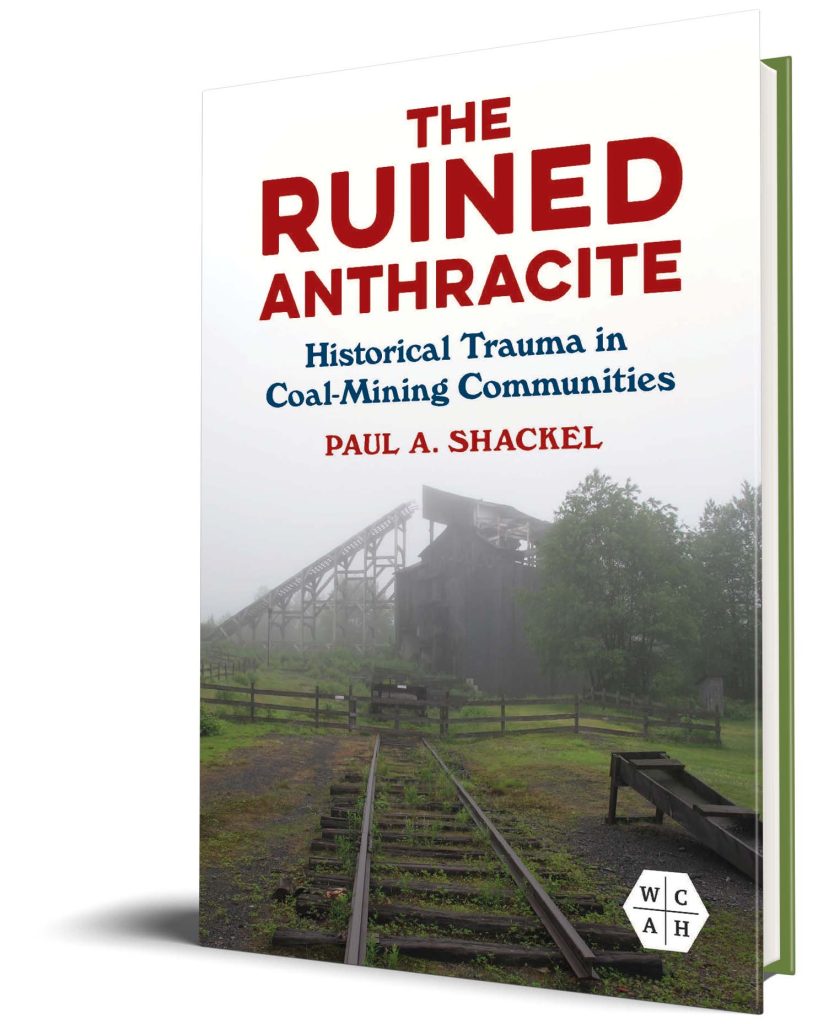Paul A. Shackel, author of The Ruined Anthracite: Historical Trauma in Coal-Mining Communities, answers questions on his new book.
Q: Why did you decide to write this book?
Over a decade ago, I began my heritage research project in the anthracite coal region of northeastern Pennsylvania. I initially focused on an 1897 labor massacre, where immigrant coal workers from eastern and southern Europe went on strike for better working and living conditions. When the striking miners reached the coal patch town of Lattimer, they were fired upon by the sheriff and his posse, killing 25 of the strikers. They were killed because the new immigrants were not perceived as equals, and some in the community did not consider them humans. Our archaeology work found the area of conflict (see Remembering Lattimer, 2018, University of Illinois Press). After that survey, I worked with professionals and graduate students doing archaeology and discovering the homes of these new immigrants revealing information about their daily life.
Today, the region is at the forefront of anti-immigration sentiment. Those who have worked to pass anti-immigration legislation are the descendants of immigrants who faced similar prejudices a century ago. It became clear to me that universal values connect the struggles of the historic immigrant and the newest immigrants. My goal is to identify these universals, connect the past to the present, and develop a better understanding between people of different ethnic origins.
Q: What is the most interesting discovery you made while researching and writing your book?
Working with archivists from the Pennsylvania State Museum, I uncovered a set of interviews of coal workers and their families which were recorded in the 1970s. Many of these people faced severe hardships and were always on the brink of starvation. They suffered from various illnesses, and many coal workers suffered from black lung disease. I expected the narrators of these oral histories to have a harsh critique of unchecked capitalism. Rather, many of these stories were about everyday life in the coal mining towns. The narrators spoke about a heroic past and focused on how they could make do and overcome these harsh conditions and survive to the next generation.
Q: What myths do you hope your book will dispel or what do you hope your book will help readers unlearn?
While I used oral histories of the mining community in northeastern Pennsylvania, I also performed several dozen interviews with the newest immigrants to the region. The majority of the latest immigrants to the City of Hazleton come from the Dominican Republic. They began migrating to the area in the early 2000s, finding unskilled work in warehouses like Amazon. Because of the depressed economy, they could obtain relatively inexpensive housing compared to other urban areas. Unfortunately, today the region is known for its racial tensions between the older, established, white community and the new Latinx community.
My interviews with the newest immigrants allow me to connect the new immigrant community to the historic mining community. While the mining communities were established by people wanting a new and better life for themselves and their families, so do the newest immigrants to the region. While speaking a different language and maintaining a different culture, both communities have similar values.
Q: What is your advice to scholars/authors who want to take on a similar project?
During Covid, I could not go into the field and conduct research. However, I identified a set of historic oral histories (1970s) in the Pennsylvania State Archives. I could only undertake this project because I developed a good relationship with archivists, who were more than willing to help with my requests. It was impressive that I could accomplish so much via email correspondence and internet searches. While it may be easy to perform archival research via the internet, it also takes time to build relationships, making these transactions move seamlessly. I am grateful for the archivists at the Pennsylvania State Archives.
Q: What do you like to read/watch/or listen to for fun?
I am a baseball fan, and I enjoy traveling with my wife, visiting minor league and major league ballfields, and watching games. We recently visited the oldest standing stadium, Rickwood Field, built in 1910, for the Birmingham Barons. Growing up in the Bronx, I remain a Yankee fan, although living close to DC, the Washington National also has a small place in my heart.
I love to read biographies, and perhaps that is why I enjoyed writing this book, which synthesizes historic and contemporary oral histories. So in a way, I was creating a biography of the people of the anthracite coal region.

Paul A. Shackel is a professor in the Department of Anthropology at the University of Maryland, College Park. His books include Remembering Lattimer: Labor, Migration, and Race in Pennsylvania Anthracite Country.

